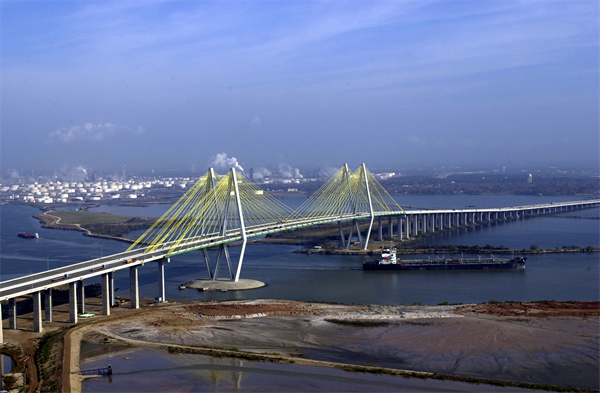- CURRENT LOCATION: HOME
- >> About Shaanxi
- >> Global Associations
- >> Sister Cities
- >>
- Yulin
Baytown (U.S.A.)
2017-04-27 10:17:51 , Source : The Government Website of Shaanxi Province
Baytown is a city within Harris County and partially in Chambers County in the Gulf Coast region of the U.S. state of Texas. Located within the Houston–The Woodlands–Sugar Land metropolitan area, it lies along State Highway 146 and Interstate 10. It is the sixth-largest city within this metropolitan area. As of 2010, Baytown had a population of 71,802, and it had an estimated population of 76,127 in 2014.
History
The area of Baytown began to be settled as early as 1822. One of its earliest residents was Nathaniel Lynch, who set up a ferry crossing at the junction of the San Jacinto River and Buffalo Bayou. The ferry service that he started is still in operation today, now known as the Lynchburg Ferry. Other early residents of Baytown include William Scott, one of Stephen F. Austin's Old Three Hundred, and Ashbel Smith, who owned a plantation in the area. One of Baytown's first babies born was Gertrude Gardner.
The city now known as Baytown was originally three separate towns. The first of these was Goose Creek, named for the bayou of the same name where Canada geese wintered and whose name is still reflected in the area's Goose Creek school district, whose establishment dates back to before 1850. With the discovery of the Goose Creek Oil Field, the rival communities of Pelly in the late 1910s, and East Baytown in the early 1920s, developed as early boomtowns. The "East" in East Baytown was later dropped because it was west of Goose Creek.
Serious talk of merging the three cities began shortly after World War I, but the community of Baytown was opposed to this idea. However, in 1947, the three cities finally agreed to consolidate. The citizens settled on the name Baytown for the new combined city. Baytown as it is known today was officially founded January 24, 1948.
In 1916, the Humble Oil and Refining Company, founded by one-time Texas governor Ross S. Sterling and his associates, in developing the Goose Creek Oil Field, built the first offshore drilling operation in Texas and the second in the United States. The company later built the Baytown Refinery, which would become one of the largest Exxon refineries in the world. Since then, many other refineries have been built in the area. Exxon-Mobil is still one of the major employers in the city and now runs over 10 plants in the area.
Following the discovery of oil nearby, the population of Baytown and the Tri-Cities boomed. Many immigrants arrived in Baytown, among them a number of Jewish families who founded a synagogue, K’nesseth Israel, in 1930.
Economy
The centerpieces of Baytown's economies are three industrial districts the city has created, all outside the city limits but within its extra-territorial jurisdiction. These districts primarily support petroleum and petrochemical processing. The anchors of the business community are ExxonMobil, Bayer, and Chevron Phillips. The ExxonMobil Baytown Complex, founded in 1919, is one of the world's largest industrial complexes. The Baytown Refinery located there is the largest in the United States. The Bayer Baytown Industrial Park is the largest of Bayer's U.S. chemical processing sites producing a variety of petrochemical products. The Cedar Bayou plant, in operation since 1963, is Chevron Phillips Chemical's largest manufacturing site in the United States.
In addition to the heavy industry in the business community, Baytown is home to the Cedar Crossing Industrial Park. With a total expanse of 15,000 acres, Cedar Crossing Industrial Park is considered the world's fifth largest industrial park and the largest on the Gulf Coast. Cedar Crossing has attracted many top-tier companies with significant operations, including Home Depot's 755,000-square-foot distribution hub, Walmart's 4.2 million-square-foot import center (their largest in the U.S.), JSW Steel's plate and pipe manufacturing facilities, and Borusan Mannesmann's $148 million steel pipe manufacturing facility. Other occupants include Exel, S&B Engineers, National Oilwell, GE Water, TMK-IPSCO, Century Asphalt, Samson Controls, and LS Energy Fabrication.
As of 2006, the largest taxpayers in the city were ExxonMobil Company, CenterPoint Energy, Verizon Southwest, Wal-Mart Stores, Inc., Continental Airlines, Inc., Valero Marketing & Supply, Car Son Bay LP, Memorial NW Pavilion Trust, Camden Property Trust, and LCY Elastomers LP.
Arts and culture
The Baytown Little Theater is a community theater in Baytown run entirely by volunteers. The theater has been in operation for 55 years (as of 2015) and is one of the longest continuously running community theaters in Texas. The theater typically produces six shows each year from September to August, with each show giving seven performances.
Tourism and recreation
Baytown Nature Center, located on a 450-acre (1.8 km2) peninsula along the Houston Ship Channel and surrounded on three sides by Burnet Bay, Crystal Bay, and Scott Bay, is both a recreation area and a wildlife sanctuary that is home to hundreds of bird species, mammals, reptiles, and aquatic species.
Royal Purple Raceway is a motorsports complex featuring National Hot Rod Association (NHRA) races and a weekly drag racing program. Established in 1988, the venue accommodates 40,000 fans and included a high-banked dirt oval race track that hosts races each year from March through October.
San Jacinto Mall is a large regional shopping mall located in Baytown along Interstate 10. It is currently managed by Triyar Cannon Group. The mall has five anchor stores, a food court and Premiere Cinemas 11, although much of the mall's leasable space is unused.
The Baytown Symphony Orchestra, in residence at Lee College, performs several concerts throughout the year for the enjoyment of the public.

Government Organizations



Other Links

Copyright@www.shaanxi.gov.cn All Rights Reserved
Registration Number:陕ICP备10004160号
